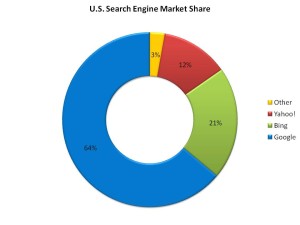When people use the term “search engine,” they almost always mean the dominant player in the industry, Google. There’s a reason why the brand has become a verb: It established itself early as the best search engine on the market, and that reputation has been slow to erode.
The search engine field is not, however, a monopoly. There are several competitors that Google faces, and some that are legitimate contenders, especially overseas. Nevertheless, Google still holds the lion’s share of the market share in the world of search.
How much of the market does Google hold? Just like with most questions in the legal field, there’s a simple answer, and a more complex one.
Here’s the simple answer.
The more complex answer has two components to it.
First, Google’s market share is on the decline. While they still hold a significant majority of the field, Google started 2015 holding its smallest share of the market since 2008. While they’re still the biggest player in the game, Google’s fall has allowed its competitors, especially Bing and Yahoo, to inch their way back into relevance. Bing has even managed to reach the 20% landmark. So, yes, Google is still the big name. However, its firm hold on the top spot has been loosening, recently, making it necessary to pay attention to the other players, as well.
Second, when it comes to search engine optimization (SEO), at least, the differences between the search engines has been shrinking. Search engines use algorithms – established and rigid processes that involve countless mathematical calculations – to put the most relevant and important websites on the results page after you search for something. By independently fine-tuning these algorithms to make their results more satisfying, all of the search engine platforms – Google, Yahoo, Bing, and the others – have come to a certain degree of consensus on how things should be done. As a result, identical searches using the different platforms end up producing more or less the same results.
This has several implications, for your law firm’s website.
Because the search engine platforms are becoming more and more in step with how they put together results pages, writing content for your web page or legal blog that caters to a specific search engine become less important. They’re all doing more or less the same thing, so individually targeting a single platform becomes less crucial.
However, because of the greater parity in market share, it has become more important to analyze your SEO on all search engine platforms. It’s not enough to see where you’re ranking on Google, anymore.
